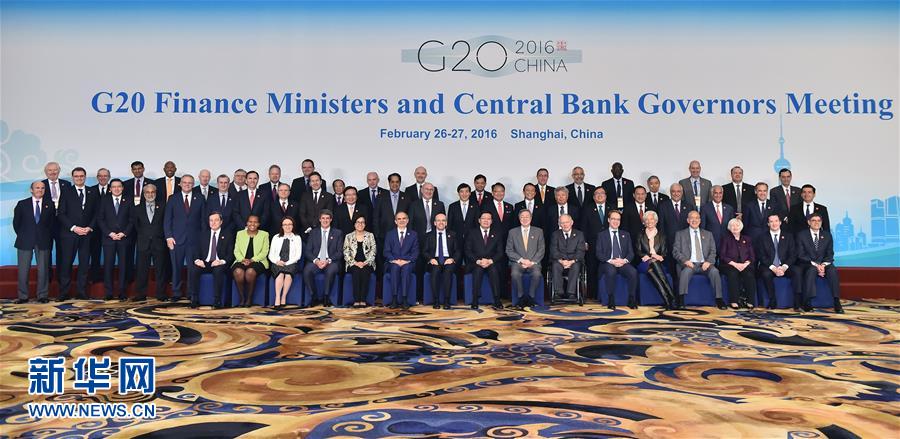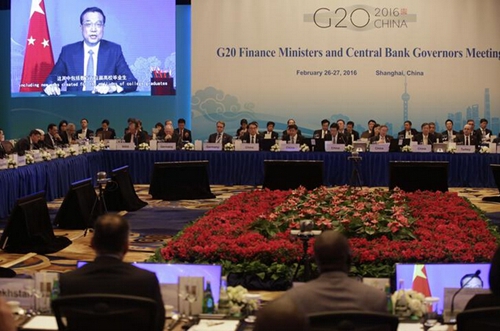发布日期:2016-03-01
点击量:
北外G20研究中心专家受央视网邀请就G20上海会议的主要内容撰写国际评论文章。2月26-27日,作为2016年G20领导人峰会主办国的中国在上海召集了第一次G20财长和央行行长会议并发布《公报》。
中心专家认为,推动成员国甚至更广范围的金融协作、促进各国的金融稳定是此次上海会议重点关注的内容;由于货币政策的重要性,G20国家之间更应该注意协调货币政策,增加透明度,以减少可能带来的负面溢出效应。专家表示,“2016年,中国作为峰会的主办国,更有责任引领G20‘继续密切监测全球经济和金融形势’,为更为广泛的金融协作、更为稳定的金融环境做出贡献。”文章内容充实,分析全面,受到广泛关注。
撰稿:G20研究中心 左洁
文章链接:
中文http://panview.ipanda.com/2016/02/29/ARTIPQ16Zawh9AjzLxQrZzfV160229.shtml

2月26日至27日,二十国集团(G20)财长和央行行长会议在中国上海举行。图为参加会议的代表们合影。
【熊猫观察原创】2月26日至27日,作为本年度G20领导人峰会主办国的中国,在上海召集了第一次G20财长和央行行长会议,并于27日晚发表了《G20上海会议公报》。众所周知,财政、金融政策可谓一国宏观经济政策的命脉所在。因此,新年伊始,就先期召开的财长和央行行长会议,正是为二十国集团加强宏观经济政策的沟通、协调提供了平台,更为即将在9月召开的领导人峰会做好准备。
事实上,中国作为东道国,在过去的一段时间里经历了股市剧烈震荡、汇率改革和币值下挫、外汇储备减少和资本流出等金融波动;与此同时,很多新兴市场国家也在经历货币贬值、资本外流等金融困境;就连美、日、欧等发达国家和地区,在货币政策上也是举步维艰。因此,如何利用G20这一平台,推动成员国甚至更广范围的金融协作、促进各国的金融稳定,就成为本次会议的一个重点议题。
汇率是国际金融领域的关键指标。近一年来人民币和一些经济体货币的贬值引起了广泛关注。当然,这有后危机时代全球经济继续复苏下各国不均衡的大背景,也有各国汇率政策等方面的原因。《G20上海会议公报》指出,汇率的过度波动和无序调整会影响经济和金融稳定。因此,中国将就外汇市场与成员国密切讨论沟通。对于人民币本身,李克强总理在此次会议的视频讲话中肯定了人民币汇率不存在持续贬值基础。中国也在《公报》中重申了中国一贯的汇率承诺,包括避免竞争性贬值和不以竞争性目的来盯住汇率。
伴随着货币贬值及贬值预期的存在,中国及一些G20中的发展中国家在过去的一年里经历了外汇储备减少和资本外流。但是,正像中国人民银行行长周小川在答记者问中指出,之前包括中国在内的很多国家积累了高额的外汇储备,因此在到达拐点后会下行。关键是,引起这种下行的宏观经济因素是否值得担心。从中国目前来看,其对外支付能力是没有问题的。但是,为了确保宏观经济政策的恰当与平衡,中国要借助G20的平台倡导更好地监测资本流动,更加及时地识别风险,在吸取各国经验的基础上总结并适时审议政策工具和框架,以应对大规模资本流动带来的挑战。
货币走势、宏观经济的表现不同,也带来了各国货币政策上的不同倾向。中国在当前经济向新常态调整的背景下,继续实行稳健的货币政策。其他国家也都会根据自身的实际情况选择适合的货币政策。但是,由于货币政策的重要性,G20国家之间更应该注意货币政策的协调,减少政策的不确定性,增加透明度,从而减少可能带来的负面溢出效应。
当然,G20财长和央行行长会议也同样认识到稳定、有韧性的国际金融架构对于促进强劲、可持续、平衡增长以及金融稳定的至关重要。因此,本次会议批准了国际金融架构工作组的工作计划,旨在推动国际货币体系的平稳运行和有序演变。支持一个强劲、以份额为基础、资源充足的IMF。
G20在过去几年里在维护金融稳定方面取得了显著成绩。2016年,中国作为峰会的主办国,更有责任引领G20“继续密切监测全球经济和金融形势”,为更为广泛的金融协作、更为稳定的金融环境做出贡献。(作者:任康钰,北京外国语大学二十国集团研究中心)
英文 http://english.cntv.cn/2016/02/29/ARTIIwnYvYqXz4Mcmrba8m9t160229.shtml
By Ren Kangyu, G20 Research Institute of Beijing Foreign Studies University
The first G20 Finance Ministers and Central Bank Governors Meeting in 2016 was held in Shanghai on Feb. 26-27, and China will be the host country for the G20 Summit 2016. The G20 meeting Shanghai Communique was issued on Feb. 27. Financial and monetary policies serve keys to national macroeconomic policies.

Holding the Finance Ministers and Central Bank Governors Meeting at the beginning of the year could enhance better cooperation on macroeconomic policies to prepare for the forthcoming G20 leaders' Summit in Hangzhou in September.
China has suffered a severe downturn of its stock markets, while currency exchange rate reforms, RMB devaluation, foreign exchange reserves dropping, capital outflows and many other forms of financial volatility have occurred recently.
Many emerging market countries are also experiencing currency devaluation, capital outflows and other financial difficulties. Even the United States, Japan and other developed countries and regions in Europe remain uncertain about what monetary policies they will undertake.
The G20 platform can promote financial cooperation among G20 countries, making it a priority issue for the meeting. The currency exchange rate is a key indicator of the international financial sector. During the past year, the devaluation of the RMB and other currencies has caused much concern.
Some countries' had experienced uneven developments during the global economic recovery, and now we are in a post-crisis era, causing different exchange rate policies to arise.
The G20 meeting Shanghai Communique has mentioned that excessive exchange rate volatility and disorderly adjustments would impact economic and financial stability. Beijing will hold close discussions on foreign exchange markets with G20 member states.
Chinese Prime Minister Li Keqiang said in his video speech that there exists no basis for continuous RMB exchange rate depreciation. Beijing holds a commitment to the exchange rate, avoiding competitive devaluations and would not peg the exchange rate for the sake of competition.
Due to currency devaluations, China and other developing countries of the G20 had to dip into foreign exchange reserves and try to slow down capital outflows in 2015.
However, the People's Bank of China Governor Zhou Xiaochuan mentioned in a press conference that many countries and China included have accumulated high foreign exchange reserves that would eventually go down after reaching a high point.
Is it necessary to worry about these macroeconomic factors causing an economic downturn? Currently, China has sufficient reserve funds to handle all foreign payments.
However to ensure balanced macroeconomic policies, China relies on the G20 platform to advocate for better monitoring of capital flows and timely identification of financial risks, utilizing review policy tools to contend with large-scale capital flows.
Different currency movements and macroeconomic performances also spark different government responses on state monetary policies. Under a new economic normal adjustment, China intends to implement a prudent monetary policy.
Other countries would undertake appropriate monetary policies according to their situations. Accordingly, G20 countries should pay more attention to monetary policies coordination among member states to reduce uncertainties, increase transparency and lessen negative consequences.
The G20 meeting endorses resilient, sustainable and balanced growth, along with financial stability. The meeting has approved the work plan for global financial architecture to promote smooth operations of the international monetary system that supports a strong quota-based and well-resourced IMF.
In the past few years, G20 has made significant achievements to maintain financial stability. China would assume its responsibility to lead the G20 to monitor global economic and financial conditions and seek wider financial cooperation for a more stable financial environment.
( The opinions expressed here do not necessarily reflect the opinions of Panview or CCTV.com. )

